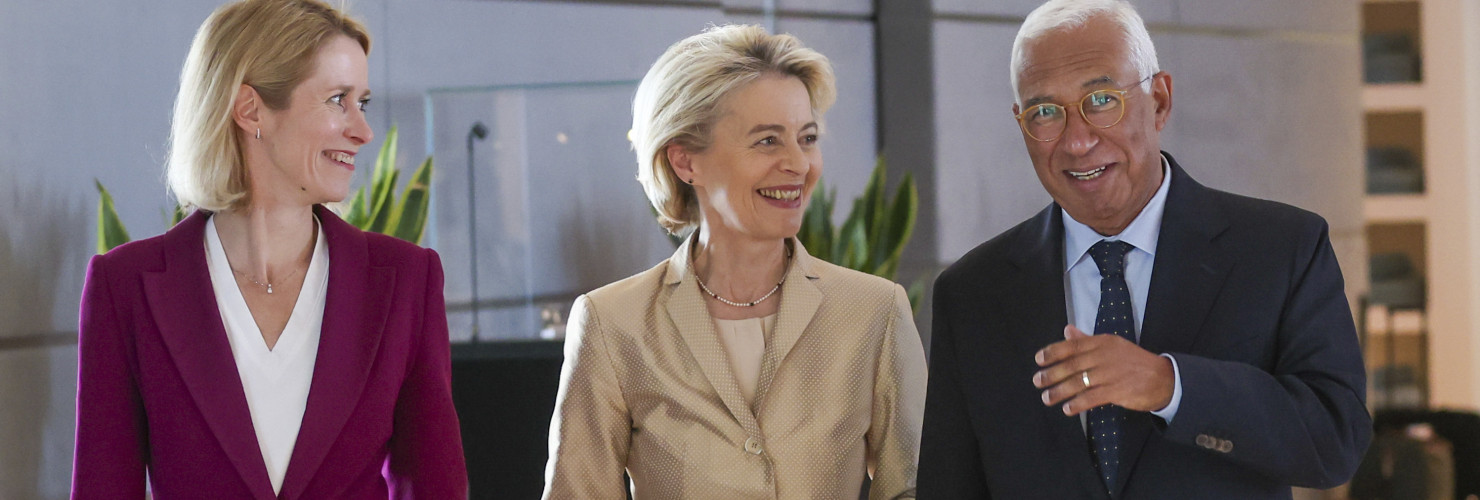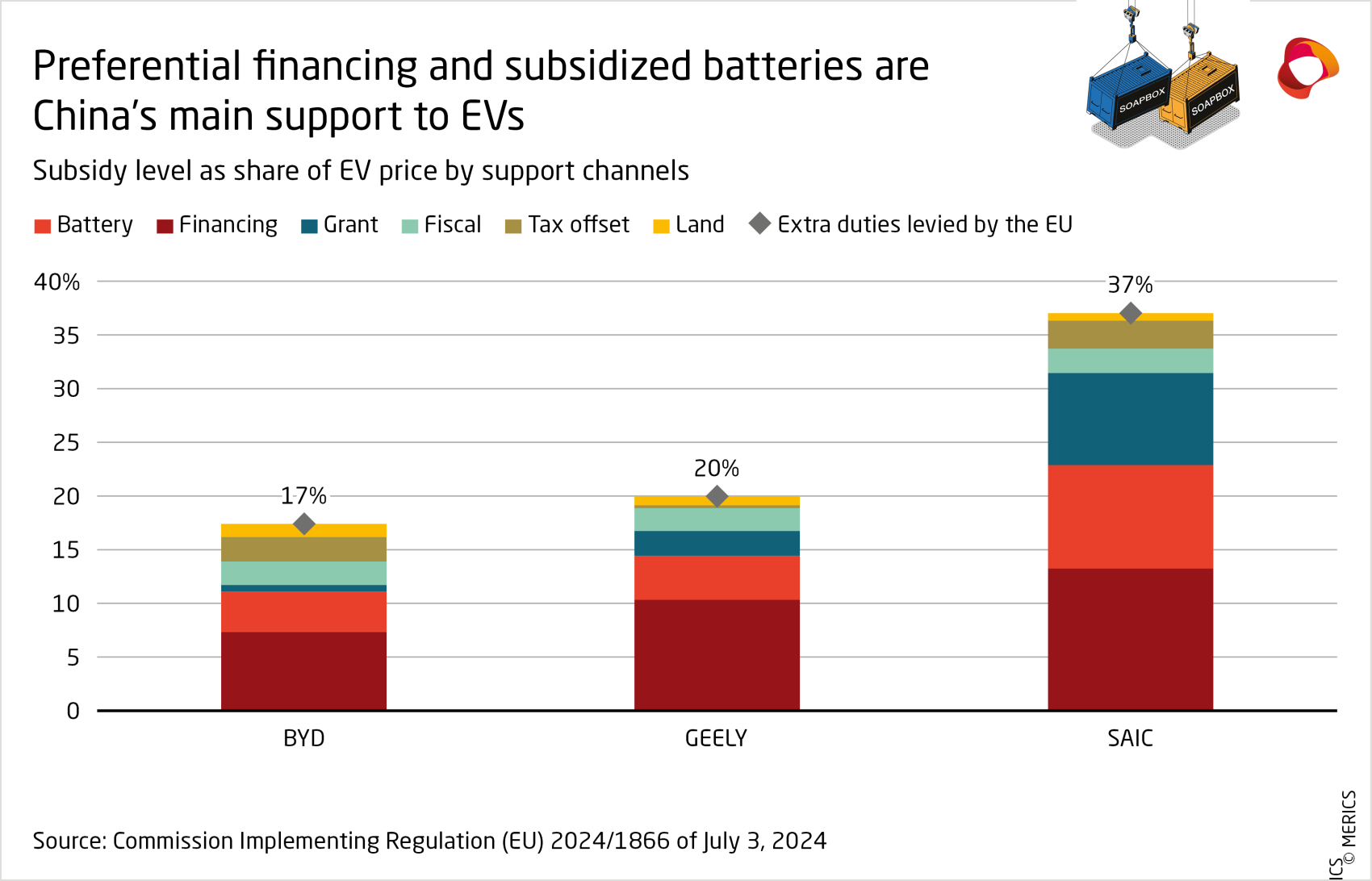

How China sees the EU's changing leadership + EV subsidies + China-Russia
Analysis
How China sees the European Union’s changing leadership
By Abigaël Vasselier
Political volatility and change have usurped Europe’s traditional summer lull, and China sees this as evidence of a weak and anxious EU. The topic of competitiveness is dividing European publics and policymakers. China will closely watch how this plays out during the six-month Presidency of the Council of the European Union led by the right-wing government of Hungary.
The new European political landscape seen from China
The rise of the extreme right in June’s European Parliament elections won’t necessarily be beneficial for China, but a second mandate for Ursula von der Leyen as President of the European Commission and the arrival of Kaja Kallas as the new High Representative and Vice President is not good news either. This leaves Beijing looking to the former socialist Portuguese Prime Minister Antonio Costa for support, as he will take over as President of the European Council, chairing the quarterly meetings of the 27 member-state leaders.
China expects consistency in the Commission-driven China policy with economic security and de-risking as key pillars, but it also foresees some marginal changes. President von der Leyen will not enjoy automatic support of her China agenda from French President Emmanuel Macron and German Chancellor Olaf Scholz who are in weak positions at home. Beijing also expects von der Leyen to adjust her China policy should Trump return to power – also after criticism of her pro-US stance during the European elections. A tougher approach may be expected. Kallas will support von der Leyen in standing up to China, notably in the context of the war in Ukraine. Beijing believes her tough stance on Russia will make solutions even more difficult. Kallas is expected to double down on curtailing China’s support to Russia’s war efforts.
Antonio Costa is Beijing’s only card. The China Chamber of Commerce to the EU has depicted Costa as the man who welcomed Chinese investment in Portugal when it was greatly needed, and he has a very good track record in Portugal-China relations. Beijing remembers Costa’s opposition at the June 2017 European Council to a European Foreign Direct Investment screening mechanism.
The rise of the extreme right reveals a European disconnect
The unprecedented far-right shift across Europe shaped the new European Parliament, resulting from several crises. China is not displeased to see fragmentation and division across Europe, especially over values and ideology, which fuels its narrative of the West in decline. However, a Europe that turns inward will certainly be more difficult to navigate.
As China sees it, European elites have become disconnected from the public. Liu Lirong, associate professor at the Institute of International Studies, Fudan University, says the EU policy-making system is no longer transparent and lacks legitimacy. In short, “the European public lacks trust in EU politics.” Confrontation in European society is intensifying and, with it, the level of violence. For Liu, this is also driven by fake news and manipulation on social media. Reporting on migration fuels populism and creates the impression of intense political division.
China sees European divisions over values and ideology as evidence of weakness. In describing Hungary’s Presidency, Chinese media often refers to the government as “non-mainstream” due to its different views on Russia and divergence from common European values. By taking very similar stances on Russia’s war in Ukraine and the Israeli-Palestinian conflict, traditional European political parties have narrowed voters’ choices and ceded space to the far right.
European countries also differ in their responses to the rise of extremism. Liu says Germany, for example, does not listen to public opinion and rising calls for change. He has a similar critique of France, which, despite parliamentary elections, will see no change in government. Still, the Chinese leadership and think-tankers now acknowledge that the rise of right-wing populism is bad news for Europe’s trade and economic agenda.
For China, the change in EU leadership, in several member states, the UK, and NATO are increasing anxiety and will likely make Europe even warier of China. The topic of “anxiety” in the Chinese press and think tank reports on Europe reflects the fragmented political landscape, the disconnect between the people and the elite, and the failure of Europe’s leadership to deliver on digitalization, climate and decarbonization goals, and competitiveness. Beijing has closely followed the EU’s work on competitiveness. What is at stake is of course whether Beijing will continue to enjoy a very open European market, how Europe and the US can work together, and how competitive European companies can become.
Europe has produced more than 580 documents on industrial competitiveness, efforts that, according to Xin Hua, director of the EU Studies Center at Shanghai International Studies University, have expanded since von der Leyen arrived. Xin says Europe intends to overcome its “competitive anxiety” via three priorities: securitizing economic issues, de-risking European supply chains and building a resilient economic system. Xin notes that “resilience” appeared 36 times in the European Economic Security Strategy released by the EU Commission in June 2023.
Whether Europe can unite in pursuing a competitive agenda, especially vis-à-vis Beijing, is the first question. Hungary’s Prime Minister Victor Orban is perceived in China as the best European leader for ensuring political stability and continuity in Europe and towards China. Orban will influence the competitiveness agenda and has set this as the first priority of Hungary’s Council Presidency. Chinese media are already highlighting Europe’s divergent views on China’s role in its competitiveness.
Another question is whether Europe can work with the US to overcome this anxiety over competitiveness. Xin highlights how the US leadership undermined European competitiveness during von der Leyen’s past mandate and says this will also define Europe’s agenda and capacity to act after the US elections in November.
Europe is fragmented over its competitiveness vis-à-vis China. The Chinese press echoing European CEOs’ concerns about tariffs and pushing a trade war narrative are attempts to ensure that Europe does not pursue that path. The media portray European businesses and public opinion as against tariffs and the EU leadership and some governments in favor. This matches the perceived disconnect between governments and European public opinion.
Divisions over China’s role in European competitiveness will remain. From Beijing’s perspective, this weakness could certainly be a source of leverage over Europe in the future.
Read more:
- Liu Lirong: Political polarization reveals the gap between EU elites & the public
- China Chamber of Commerce to the EU: The EU's new leaders: von der Leyen, Costa, Kallas – what are their stances towards China?
- Xin Hua: The EU's geo-economic anxiety is likely to intensify
- Jiang Li: Hungary is "in charge", what are the variables of the EU?
Soapbox-MERICS Data Highlight
EU report reveals pervasive Chinese EV subsidies
In the Soapbox-MERICS Data Highlight, leading economists discuss data visualizations of EU-China economic relations. We have partnered with trade specialist Rafael Jimenez Buendía, Lecturer of International Trade at Taltech University in Tallinn, Estonia, and co-founder of “Soapbox,” a free weekly newsletter focused on China trade. Rafael and MERICS economics analyst François Chimits provide commentary on timely data relevant to EU-China relations.
In this edition, we delve into the findings of the EU subsidy investigation on made-in-China electric vehicles (EVs) that has led to preliminary extra duties of 17-38 percent on such imports into the single market.
Rafael Jimenez Buendía:
The European Commission's report on subsidies for EVs originating from China provides a trove of evidence on the pervasive nature of Beijing’s support for the Electric Vehicle supply chain. The Commission focused on a representative sample of two private companies (BYD, GEELY) and one state-owned enterprise (SAIC). The report shows that China has made a concerted “whole of government effort” to subsidize the industry which it has long identified as strategic.
One example is the lack of a 13 percent value-added-tax rebate on exported lithium, which incentivizes local producers to sell domestically, lowering the price in China for this essential input produced in large quantity there. Another example is that the two largest battery producers, CATL and BYD, could purchase lithium iron phosphate at favorable prices set by the Chinese government through a special pricing mechanism.
Despite the lack of cooperation from Chinese authorities and firms, the findings of the EU study are fact-based and detailed. Discussions will take place behind closed doors in the coming weeks, and the Chinese government will likely try to gain leverage by presenting grievances about various products imported from the EU.
We expect more, not fewer, subsidies in the future. Measures will include the previously announced plan "to support new energy vehicle companies to accelerate the construction of overseas marketing and after-sales service networks, and increase brand promotion."
MERICS Senior Economist François Chimits:
The European Commission’s report provides one of the most granular and comprehensive views on the distortive environment to support the development of strategic sectors in China. It sheds light on the type of competitor and systemic rival Europeans are contending with.
For a state-guided economy like China, traditional subsidies are only a fraction of the public support provided as part of its industrial policy. State-controlled financial institutions are incentivized through economic and political means to follow the guidance of the central state. So are the multiple layers of local government and suppliers further up the value chain, especially those tightly linked to the party state. Those efforts include the very minerals used in EV batteries, with each layer of the value chain a complex and intertwined set of support and incentives.
Given the very long list of strategic sectors in Beijing’s industrial policies and the footprint of Chinese production in most industrial sectors, the implications of the findings are particularly consequential. As the report also demonstrates, the answer does not have to be a binary choice between blocking all Chinese imports and doing nothing in order to benefit from cheap Chinese goods.
Update
Europeans turn up the heat on Chinese support of Russia’s war
In the last four weeks, European leaders have ramped up both the language and measures against China’s de facto support of the Russian war machine. A little more than two years into the Russian war on Ukraine, Sino-Russian trade reached an unprecedented USD 239 billion in 2023, almost double that before the war. The flows encompass essential inputs for the Russian military-industrial complex, from semiconductors to machinery. Bilateral relations have also not been short on cooperation and diplomatic support since February 2022. After multiple efforts and hopes that Beijing might play a positive role in bringing Moscow to reason, Europeans seem to have opted for a more forceful approach.
What you need to know:
- Much tougher language: The Europeans have not minced words. The G7 in late June underscored that “China’s ongoing support for Russia’s defense industrial base is enabling Russia to maintain its illegal war in Ukraine.” The communique of the recent NATO Washington summit went a step further, calling China “a decisive enabler of Russia’s war against Ukraine,” pointing at the provision of “dual-use materials, such as weapons components, equipment, and raw materials.” A similar document a year ago had expressed hopes to see China “play a constructive role” in ending the Ukraine conflict.
- Actions say more than words: After the G7 meeting and alongside similar actions by the UK, the US and Japan, the EU decided to add 20 Chinese firms to its sanction list – 7 from the mainland and 13 in Hong Kong – for their support of Russia's military-industrial complex in the Ukraine war, among a list of 61 new entities targeted. They are mostly small high-tech and aerospace producers located in Southern China. The measures come on top of the previous batch(es) of seven Chinese entities previously caught in the net of European sanctions. Those firms are prevented from doing business with European entities under threat of having their EU assets seized.
- China not happy: Rather unsurprisingly, Beijing has pushed back on those words and actions. After underscoring the allegedly illegal nature of unilateral sanctions, the Chinese Ministry of Commerce described the NATO language as "full of Cold War mentality and belligerent rhetoric, and China-related content full of provocations, lies, incitement and smears."
Quick take: As the NATO communique states, “enabling the largest war in Europe in recent history” cannot come without this “negatively impacting [China’s] interests and reputation.” In a recent survey of European business leaders in China, only a third saw the situation seriously impacting bilateral EU-China relations, far behind the issue of Chinese overcapacities at 80 percent. The recent measures and language mentioned above show that such support is quite likely to significantly disrupt bilateral relations. Indeed, numbers indicate the Russian war efforts would have hardly been sustainable without Chinese economic backing, which poses the uncomfortable question of whether China should also be considered a security threat.
Read more:
- NATO: Washington Summit Declaration issued by NATO Heads of State and Government (2024)
- European Council: Apulia G7 Leaders’ Communiqué
- Chinese MFA: Foreign Ministry Spokesperson Lin Jian’s regular press conference on July 11, 2024
- MERICS: China-Russia alignment: a threat to Europe's security
- SCMP: EU members split sharply over measures to de-risk China economic ties
Short takes
Berlin blocks MAN sale of gas turbine unit to Chinese firm
The German government blocked the sale of MAN Energy Solutions, a subsidiary of Volkswagen, to Chinese state-owned CSIC Longjiang GH Gas Turbine over concerns that the equipment may be used in warships. The decision followed a review initiated in September 2023. (Source: Reuters)
Chinese ecommerce platforms under EU regulatory pressure
Chinese ecommerce firms Temu and Shein have come into the crosshairs of the European Commission. The EU sent both Requests for Information in late June regarding their implementation of various obligations under the EU’s Digital Services Act, especially the design of online interfaces, protection of minors, transparency of recommender systems, and traceability of traders. (Source: MarketingTech)
China and Belarus conduct joint military exercises near the Polish border
In what appeared to be a signal to NATO as the alliance convened in Washington (July 9-11) and a follow up to the Shanghai Cooperation Organization summit (July 3-4), China and Belarus held an 11-day joint military drill called Eagle Assault 2024 (July 8-18). Officially an “antiterrorist” exercise, the Chinese Defense Ministry stated the exercise also aims to “deepen practical cooperation between the two armies.” (Source: AP)
Germany reaches a decision on phasing out Huawei and ZTE
The German government has officially reached a deal with telecom providers to phase out the two Chinese firms from the country’s 5G network by 2029. The details of the agreement have not been made public, but devices from the two Chinese suppliers will apparently have to be removed from the core of the network by the end of 2026, where they already have a very limited footprint. (Sources: Reuters, LightReading)





